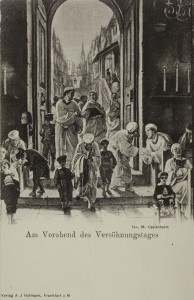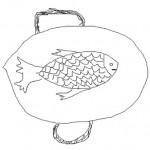What makes Rosh ha-Shanah special
The Jewish year 5778 begins today—and with it a very special time for the Jewish community worldwide. Rosh ha-Shanah is the beginning of the High Holy Days, the Yamim Noraim (literally “Days of Awe”) as they’re known in Hebrew.
I asked around my friend group a bit to find out what Rosh ha-Shanah means to them personally: → continue reading
Employees of the Jewish Museum Berlin respond:
“I like Rosh ha-Shanah, and new year festivities in general. I celebrate them all: birthdays, the High Holidays, and December 31st.” Naomi Lubrich, Media

The postcard is the only copy of a painting by Moritz Daniel Oppenheim from 1873, which was destroyed in London in 1939. © Jewish Museum Berlin, photo: Jens Ziehe
You will find more postcards from the past in our Online Showcase
“I usually use the time between Rosh ha-Shanah and Yom Kippur to figure out what’s not going so well in my life and what I want to change. I take some time to think about it and take stock.” Sarah Hiron, Education
“The High Holidays, like the Sabbath, are a chance to make time for my spiritual faith. For me they are special – holy – days. They encourage me to carry on traditions and become more aware. At the same though, they mean time off, and that means nightlife, having fun, and sleeping in.” Roland Schmidt, Host
“Although I live a secular life the rest of the year and don’t go to synagogue, Yom Kippur has a great spiritual significance for me. I fast, turn off music and disregard other forms of entertainment. Instead the day is defined by humility, contemplation, silence, and reflecting on nature. Since it’s not a joyful celebration with one central ritual, Yom Kippur is different every year, so I connect it with new and ever-changing personal experiences.” Roman Labunski, Education
Employees of the Jewish Museum Berlin respond:
“When I think back, I remember first of all friends and family, followed by food – a whole lot of food.” Roland Schmidt, Host
“I remember the meals at my grandmother’s as so sumptuous and sprawling that I had the feeling I needed to fast not just on Yom Kippur but for the whole rest of the year.” Alina Gromova, Academic Employee in the Fellowship Program, and Guide

© Alina Gromova, Jewish Museum Berlin
“To stay on the culinary topic, I can bring up the days when gefilte fish was still cooked at home. You would order two carp at the fishmonger – who was doing enough business in September to last the entire year, because the customers celebrating Rosh ha-Shanah would stand in line for live fish. You would carry home the floundering content in a metal bucket on the tram, accompanied by the cold glares of ditrustful animal rights activists sitting near you. → continue reading

